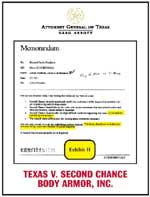Wednesday, August 11, 2004
Attorney General Abbott Sues Top Manufacturer Of Bullet-Proof Vests
Alleges potential vest failures pose threat to police officer safety
FARMER’S BRANCH - Texas Attorney General Greg Abbott today sued a major manufacturer of police protective body armor, alleging a failure to reveal potentially fatal flaws in the material from which many of its protective “bullet-proof” vests have been made.
The suit againstSecond Chance Body Armor Inc. of Central Lake, Michigan, which made and sold a protective vest containing the material “Zylon,” follows an investigation the Attorney General launched last December.
According to the suit, the company maintained that its “Ultima” and “Ultimax” vests with Zylon are of lighter weight and are more effective in protecting officers than “Kevlar” vests, which have been the law enforcement standard product for years. The suit alleges that the vests manufactured with 100 percent Zylon, as these were, pose a possible life-threatening hazard to those wearing them.


Internal memoranda from
Second Chance
“There is an unacceptable risk for thousands of Texas peace officers who might be wearing Zylon vests,” said Attorney General Abbott. “Second Chance’s claims that its vests offered lightweight, superior protection are not supported by tests showing that Zylon may degrade quickly and put officers’ lives in jeopardy,” he said, while joined by three Texas police departments that filed complaints with his office.
The company claims on its Web site to be the “world leader” and “the most successful manufacturer” of wearable, concealable, soft body armor. More than 5,000 vests have been sold in Texas since about 1998, the Attorney General’s investigation revealed. Each vest cost about $800, considerably more than the traditional Kevlar vests. Although no Texas officers are known to have been injured or killed while wearing the vests, Attorney General Abbott asserted that the risk is too great to ignore.
The Attorney General said Texas officers were unaware that by July 2001 Second Chance had substantial information from Toyobo, the Japanese manufacturer of Zylon, that the material had been found to deteriorate much more rapidly than expected when exposed to light, heat and moisture. This degradation, substantiated by independent tests in the Netherlands, led the Dutch laboratory to express serious concerns about the suitability of Zylon for use in the vests.
Although Second Chance knew of these concerns, it continued to market the vests to a growing customer base in Texas and throughout the nation, the suit maintains. The company ignored the advice of its own director of research to notify customers of safety concerns. In late December 2001, the company estimated it would have about 236,000 Ultima and Ultimax vests in use nationwide by the end of 2002.
In July 2003, Second Chance acknowledged that a 40-caliber bullet had penetrated an Ultima vest worn by a Pennsylvania police officer, seriously injuring the officer. Another officer in California was killed while wearing one of the vests. However, Second Chance informed its customers that more conclusive factual information about the apparent vest failures was needed. The company expressed concerns that officers would discontinue wearing the vests due to negative publicity, sensationalism and unethical practices by competitors, rather than accurate information.
In a memo distributed after the Pennsylvania officer shooting, company officials noted, “We at Second Chance Body Armor maintain complete confidence in our products and continue to encourage all officers to wear their armor daily.”
Not until September 2003 did Second Chance warn its customers that the vests might not be up to par. The company at that time offered “free upgrades,” which involved inserting non-Zylon ballistic pads in front of the Zylon material. But Second Chance did not offer refunds on the vests, which were sold with five-year warranties.
The Attorney General’s suit alleges numerous violations of the Deceptive Trade Practices Act by Second Chance, including false representations about the integrity of the product and failure to disclose significant information about ballistics tests.
The office seeks a permanent injunction barring Second Chance from selling vests containing Zylon in Texas, and a refund of money paid by Texas customers for the defective vests, as well as civil penalties of up to $20,000 per violation of the act, attorneys’ fees and investigative costs.
Attorney General’s lawsuit against Second Chance Body Armor
State exhibits in its suit against Second Chance Body Armor


